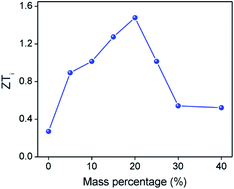Quasi-solid state nanoparticle/(ionic liquid) gels with significantly high ionic thermoelectric properties†
Abstract
Ionic conducting materials such as polymer electrolytes and ionic liquids can have a thermovoltage higher than those of electronic thermoelectric materials by several orders of magnitude, while their conductivity is much lower than those of the latter. Hence, their heat-to-electricity conversion efficiency is not high enough for practical application. The heat conversion efficiency of ionic conducting materials depends on the ionic figure of merit (ZTi). Here, we demonstrate quasi-solid state ionogels made of ionic liquids and SiO2 nanoparticles. They can have high thermovoltage and ionic conductivity. The optimal ionic ZTi value can be up to 1.47 with an ionic Seebeck coefficient of 14.8 mV K−1, ionic conductivity of 4.75 × 10−2 S cm−1, thermal conductivity of 0.21 W m−1 K−1 and ionic power factor of 1040.4 μW m−1 K−2 at room temperature. This ZTi value is almost twice the previous highest ZTi value for ionic conductors used for heat-to-electricity conversion in the literature.



 Please wait while we load your content...
Please wait while we load your content...